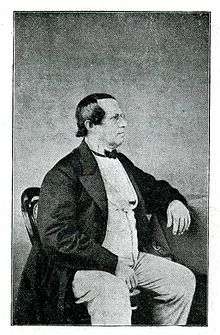Bernhard Molique
Bernhard Molique (Wilhelm Bernhard Molique; 7 October 1802 – 10 May 1869) was a German violinist and composer.

Biography
He was born in Nuremberg. His father was a musician and the boy studied various instruments, but finally devoted himself to the violin. In 1815, he received some lessons from Louis Spohr, and then studied the violin for two years at the University of Munich under Pietro Rovelli.
Career
In 1820, Molique succeeded Rovelli as court violinist in Munich and, after several successful tours, in 1826 he became music director at Stuttgart.[1] His pupils there included the violinist Henry Blagrove and the violinist, conductor and composer Alfred Mellon. Molique was well received on a visit to London when he played his own Piano Concerto No 5 on 14 May 1840. He visited England several other times before settling in London from 1849 until 1866. He died in Cannstatt in 1869.
Compositions
As a composer, Molique was unapologetically self-taught. His music displays the influence of Beethoven, Mozart, Mendelssohn and, especially, Louis Spohr. The then radical developments represented by Berlioz (who publicly praised his violin playing) and the New German School (German: Neudeutschen Schule) left Molique untouched, however.
As well as the five piano concertos Molique wrote six violin concertos (the fifth especially admired by Joachim) and a popular Cello Concerto that was successfully played in Baden-Baden, by Léon Jacquard, conducted by Hector Berlioz, on August 27, 1860. He also wrote a Symphony (1837–42), eight string quartets, the Piano Trio op.27 (championed by Hans von Bülow) and the Concertina Concerto as well an oratorio Abraham (performed in England, 1861), two masses and many songs.[2]
Selected Compositions
- Chamber music
- String Quartets, Opp. 16 (in G) and 17 (the latter in C minor)[3]
- Three String Quartets, Op. 18[4] (published 1843)[5]
- First grand trio concertante for piano, violin and violoncello, Op. 27[6]
- Sixth String Quartet, Op. 28 in F minor[7]
- Quintet for flute, violin, violas, violoncello, Op. 35, D major[8]
- Seventh String Quartet in B-flat major Op. 42 (published 1854)[9][10]
- Eighth String Quartet, Op. 44 in A minor (published by Kistner of Leipzig by 1853)[11]
- Second Piano Trio, Op. 52 in F major (published 1858)[10][12]
- Sonata for Concertina and Piano, Op. 57 (1857)
- Piano Quartet, Op. 71 in E-flat major (published 1870)[10][12]
- Concertante works
- Concertino in F minor for violin, Op. 1[13]
- Violin Concerto no. 1 in E major Op. 4 (published 1830)[6][10][13]
- Violin Concerto no. 2 in A major, Op. 9 (published 1833)[6][10][14]
- Violin Concerto no. 3 in D minor, Op. 10[15]
- Violin Concerto no. 4 in D major Op. 14 (published 1839)[16]
- Violin Concerto no. 5 in A minor, Op. 21 (published 1845)[10][17]
- Violin Concerto no. 6 in E minor Op. 30 (c. 1847?)[6]
- Cello Concerto in D, Op. 45 (published 1854)[10]
- Concertino for Oboe and Orchestra in G minor
- Flute Concerto in D minor, Op. 69[18]
- Clarinet Concerto in F minor, 1824[19]
- Oratorio
- Abraham, op. 65.[20]
- Liturgical
Notes
- Chisholm, Hugh, ed. (1911). . Encyclopædia Britannica. 18 (11th ed.). Cambridge University Press. pp. 668–669.
- Grove Music Online
- Both in Bloomington Music Library, Indiana.
- Recorded on cpo in 2003-2004 & 2006
- "Hofmeisters Monatsberichte". 1843. Retrieved December 10, 2010.
- Library of the Univ Bibl Johann Christian Senckenberg
- Also in Bloomington Music Library
- "Permalink for 1978 Edition of Molique Flute Quintet at Cornell". Retrieved 2009-01-14.
- "Persistent Link to University of Illinois Library Page for New Merton Music Edition". Retrieved 2009-01-14.
- Dates from searches at Hofmeisters Monatsbericht online (http://www.hofmeister.rhul.ac.uk ).
- At Bloomington Music Library, Indiana
- Juilliard School Library.
- "Classical Composers Molique Site". Retrieved 2009-01-14.
- Newberry Library Catalog Listing
- "Persistent Link to New England Conservatory's Fenway Libraries Entry for Violin Concerto 3 Reduced Score". Retrieved 2009-01-14.
- At Yale University Library.
- Los Angeles Public Library.
- "Cornell Permalink for 1940s Edition of Molique Flute Concerto". Retrieved 2009-01-14.
- "Permalink at BSB (Bavarian Library) for Clarinet Concerto". Retrieved 2009-01-14.
- "Permalink for Abraham Oratorio at Veech Library". Archived from the original on 2011-07-06. Retrieved 2009-01-14.
- Library of Congress listing.
Sources
- Gilman, D. C.; Peck, H. T.; Colby, F. M., eds. (1905). . New International Encyclopedia (1st ed.). New York: Dodd, Mead.